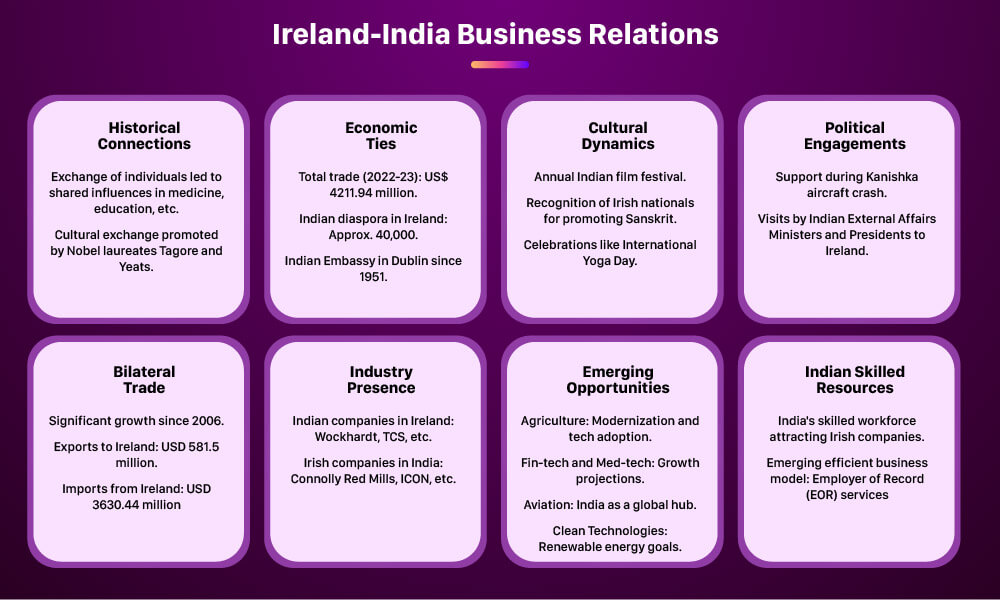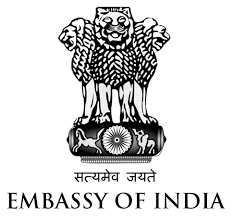When it comes to India-Ireland relations, whether it’s cultural connections or bilateral affairs, the two countries possess numerous shared activities and interests to lay out to the world. Historical evidence indicates that both India and Ireland were once under British colonial rule. During the nineteenth century, numerous Irish individuals served in the British Civil Service and colonial army units stationed in India, leading to a spread of Irish influence across various sectors such as medicine and education throughout India.
Additionally, the cultural exchange between the two nations, involving literature, music, dance, and spirituality, was promoted by esteemed Nobel laureates Rabindranath Tagore and W.B. Yeats. Through cultural events, festivals, and academic collaborations, the bond between India and Ireland has been further fortified. Over time, these historical ties have evolved into robust economic relations, with trade and investment serving as significant pillars of the bilateral relationship.
The figures will substantiate the assertion, as during the fiscal year 2022-23, the total trade between India and Ireland amounted to US$ 4211.94 million. Additionally, the estimated Indian diaspora community in Ireland stands at approximately 40,000 individuals, a fact underscored by the establishment of the Indian Embassy in Dublin as early as 1951.
Consequently, this blog aims to delve into how, over time, the people, culture, and heritage have played pivotal roles in fostering robust bilateral and commercial ties between Ireland and India, facilitating the expansion of Irish businesses into the Indian industrial market.
India-Ireland Cultural and Political Dynamics
The historical ties between India and Ireland have fostered deep cultural connections, sustained by both grassroots interactions and governmental efforts to preserve this enduring legacy. To commemorate this shared heritage, the annual Indian film festival has become a fixture in the cultural calendar of the Indian embassy. Here, filmmakers and actors from both nations captivate audiences with performances spanning Indian drama and contemporary cinema, while engaging in themed panel discussions with avid movie enthusiasts.
In a bid to enrich this cultural exchange, the Indian Council for Cultural Relations (ICCR) recognized Rutger Kortenhorst, an Irish national, with the ICCR World Sanskrit Award 2020 for his dedication to teaching and promoting Sanskrit at John Scottus School, Dublin. Additionally, ICCR celebrated India’s 75th Independence Day in Ireland by hosting the Theatrical group of Mrs. Dona Ganguly from August 19th to 21st, 2022, showcasing Rabindranath Tagore’s dance drama “Mayar Khela.”
The trend continues beyond this point. In 2023, the Indian Embassy in Dublin commemorated International Yoga Day, highlighting this significant Indian practice for fostering wellness. The event was broadcast live to unite people and advocate for healthier lifestyles. Furthermore, India extends a warm welcome to Irish individuals, mirroring the hospitality extended to Indians in Ireland. This reciprocal relationship is evident in the approximately 44,000 Irish tourists who visit India each year, as reported recently.
In addition to cultural considerations, political involvements have garnered significant recognition since both the local populace and the government of Ireland took exceptional actions to aid the Indian victims of the Kanishka aircraft crash in the Atlantic Ocean off Ireland’s southwestern coast on June 23, 1985. This bond was further strengthened by the visit of Indian External Affairs Minister Shri P.Shivshanker to Ireland for the first-anniversary commemoration of the Kanishka crash. Further political interactions between India and Ireland include the Presidential visit of APJ Abdul Kalam to Dublin’s Trinity College to deliver a public lecture, followed by his attendance at a dinner party hosted by the Irish Foreign Minister in his honor, alongside Irish President McAleese.
India-Ireland Bilateral Trade and Economic Ties
The bilateral relationship between India and Ireland has experienced significant growth since Irish PM Bertie Ahern visited India in January 2006, which included a large trade delegation. Subsequently, the India-Ireland Business Association was established in May 2008 to enhance business interactions between the two nations. According to the Department of Commerce EXIM data bank, as of March 2023, India’s exports to Ireland have reached a remarkable USD 581.5 million, while imports from Ireland to India have reached an impressive USD 3630.44 million. India’s exports primarily consist of organic chemicals, rubber, textiles, heavy machinery, and mechanical appliances, among others. Conversely, India imports significant quantities of electrical equipment such as sound recorders, optical instruments, surgical equipment, and plastic materials from Ireland.
Major Irish corporations such as Connolly Red Mills, Keventer, ICON, Globoforce, and CRH Taxback Group, among others, have established significant operations in India. Meanwhile, the Indian embassy has consistently urged Irish companies to actively participate in key national initiatives such as “Make in India,” “Clean India,” “Smart Cities,” and “Digital India.” Indian companies, in turn, have made substantial investments to establish their industrial presence in Ireland.
Notable industry leaders such as Wockhardt, Ranbaxy, and Reliance Life Sciences have established manufacturing facilities in Ireland. In a notable acquisition, Hindustan Zinc, a prominent Indian firm, purchased the largest zinc mine in Ireland, Lisheen, in May 2010 for USD 30 million. Additionally, Indian industry giants like TCS, WIPRO, HCL, Infosys, and Shapoorji Pallonji have successfully penetrated the Irish business market.
As per the implications of Brexit, Ireland is emerging as a strong economic ally for India, as both countries collaborate on various initiatives such as pharmaceuticals, medical research, cutting-edge technologies like AI, IoT, RFID, cybersecurity, and VR applications, as well as i-cloud messaging. Additionally, their partnership is bolstered by shared attributes such as the widespread use of English, low corporate taxes, and similar legal frameworks.
Emerging Business Opportunities for Ireland in India
Given the robust bilateral relationship continually strengthening, Ireland is poised to discover abundant opportunities within the Indian business market. In this discussion, we will delve into several business sectors and explore how Ireland can tap into them in India.
Agriculture
The agricultural sector in India is currently in a phase of modernization, actively pursuing cutting-edge technologies and innovative practices. Extensive research and development efforts are being directed towards fostering sustainable agricultural methods, particularly focusing on areas like efficient water management and the promotion of organic farming techniques. Furthermore, it’s worth noting that the agricultural industry in India holds significant importance, not just economically but also as the largest employer in the nation.
According to the 2023 reports from the World Bank, it contributes approximately 16% to India’s Gross Domestic Product (GDP). Given this scenario, there exist vast opportunities for Irish enterprises specializing in agricultural machinery, precision farming technologies, and crop protection innovations to explore and capitalize on within the Indian market.
Fin-tech and Med-tech
According to reports released by NASSCOM in 2023, it is projected that India’s financial technology (fin-tech) sector will surge in value, potentially reaching an impressive valuation ranging between USD 150 billion to USD 160 billion by the year 2025. Concurrently, the medical technology (med-tech) sector is anticipated to contribute significantly to India’s gross domestic product (GDP), with estimations suggesting an addition of USD 25 billion to USD 30 billion by 2025.
The rapid expansion of both the fin-tech and med-tech sectors in India signifies promising prospects for Irish companies specializing in various fields such as payment solutions, digital banking, cybersecurity, telemedicine, medical devices, and healthcare information technology (IT) solutions, offering ample opportunities for collaboration and investment.
Aviation
According to reports from The Times of India, the aviation sector in India is experiencing significant growth at present and is projected to emerge as a prominent global aviation hub. Statistical forecasts suggest that domestic air passenger traffic is anticipated to soar to 300 million by the year 2030. This promising trajectory presents vast opportunities for Irish companies specializing in aircraft engineering to capitalize upon.
Clean Technologies
India’s ambitious goal of reaching 450 gigawatts of renewable energy capacity by 2030 presents significant opportunities for Irish clean technology companies across various sectors including wind, solar, and biomass energy, waste management solutions, water purification technologies, and air quality monitoring systems.
Leveraging the Skilled Resources in India
The growing trade relationship between India and Ireland thrives on the availability of skilled resources in India, spanning various sectors such as technology, healthcare, and startups. India’s robust education system and emphasis on STEM have cultivated a highly skilled workforce, attracting Irish companies to tap into India’s IT expertise and healthcare advancements. Additionally, India’s vibrant startup ecosystem has caught the attention of Irish investors, fostering cross-border investments.
As Irish companies expand their operations in India, they have traditionally relied on outsourcing or contracting to handle human resources tasks for their remote teams. However, in recent years, a new business model has emerged that has demonstrated remarkable efficiency. By embracing the services of this new model, business owners can enjoy the cost advantages of outsourcing while maintaining the same level of control over their remote teams as they would have by forming a subsidiary in India. Thus, it offers the benefits of both approaches, making it an optimal solution. This model, known as Employer of Record (EOR), is revolutionizing the way companies manage their global workforce.
Employer of Record (EOR) services play a crucial role for Irish companies, addressing legal compliance, payroll management, and HR administration challenges. By partnering with an EOR in India, Irish companies can simplify operations, ensuring compliance with local labor laws and regulations while maximizing flexibility and scalability. This ideal engagement not only mitigates risks but also enhances bilateral trade and economic engagement between India and Ireland, promising mutual prosperity in the future.
Conclusion
We can conclude by saying that the trade relationship between India and Ireland embodies a compelling fusion of shared historical ties, cultural resonance, and growing economic interconnections. From historical colonial influences to dynamic cultural interactions and diplomatic engagements, the bond between India and Ireland runs deep and continues to flourish. The significant bilateral trade, underscored by notable import-export activities and investments spanning various sectors, underscores the robustness of their economic partnership.
Furthermore, the emerging opportunities in agriculture, financial technology, medical technology, aviation, and sustainable technologies present an optimistic outlook for Ireland to expand its footprint in India. With shared principles and complementary strengths, India and Ireland are poised to stride confidently into a future marked by collaborative efforts and achievements, epitomizing a partnership that bridges the past while envisioning a prosperous tomorrow.





 Book a Demo
Book a Demo